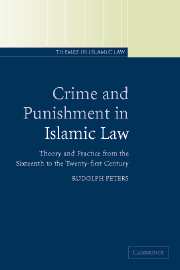 Crime and Punishment in Islamic Law
Crime and Punishment in Islamic Law Published online by Cambridge University Press: 23 November 2009
This book deals with criminal or penal law (I will use both terms indiscriminately), the body of law that regulates the power of the state to inflict punishment, i.e. suffering, on persons in order to enforce compliance with certain rules. Such rules typically protect public interests and values that society regards as crucial, even if the immediate interest that is protected is a private one. A case in point is theft. Many societies make the violation of private property rights a punishable offence, although the interests harmed by such violations are in the first place private ones. However, these societies regard the protection of property as essential for the social order and protect it by stronger remedies than those available under private law. The interests protected by penal sanctions vary from society to society. In some societies sexual acts between consenting adults are of no concern to the authorities, whereas in others the rules regulating sexual contact are regarded as so crucial for the maintenance of social order that violations are severely punished. The same is true, for instance, with regard to the consumption of alcohol and other psychotropic substances. Criminal laws, therefore, give an insight into what a society and its rulers regard as its core values.
Islamic law does not conform to the notion of law as found, for example, in common law or civil law systems.
To save this book to your Kindle, first ensure [email protected] is added to your Approved Personal Document E-mail List under your Personal Document Settings on the Manage Your Content and Devices page of your Amazon account. Then enter the ‘name’ part of your Kindle email address below. Find out more about saving to your Kindle.
Note you can select to save to either the @free.kindle.com or @kindle.com variations. ‘@free.kindle.com’ emails are free but can only be saved to your device when it is connected to wi-fi. ‘@kindle.com’ emails can be delivered even when you are not connected to wi-fi, but note that service fees apply.
Find out more about the Kindle Personal Document Service.
To save content items to your account, please confirm that you agree to abide by our usage policies. If this is the first time you use this feature, you will be asked to authorise Cambridge Core to connect with your account. Find out more about saving content to Dropbox.
To save content items to your account, please confirm that you agree to abide by our usage policies. If this is the first time you use this feature, you will be asked to authorise Cambridge Core to connect with your account. Find out more about saving content to Google Drive.